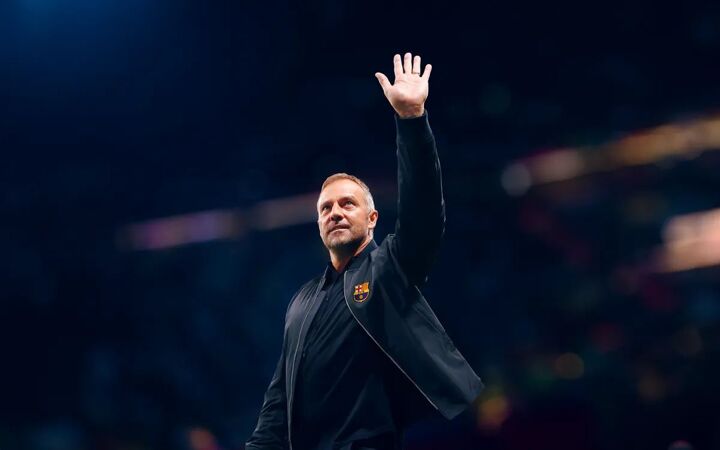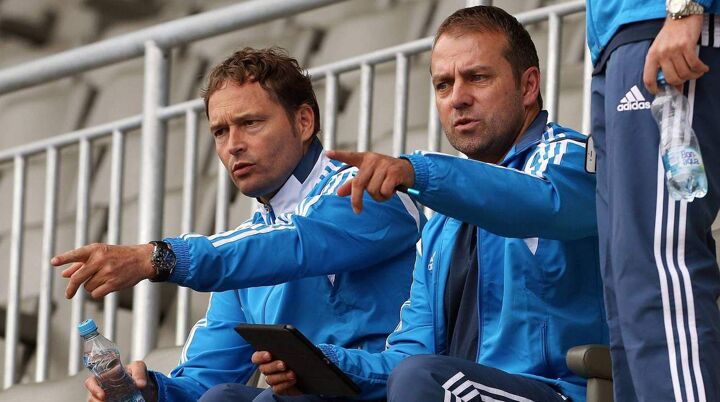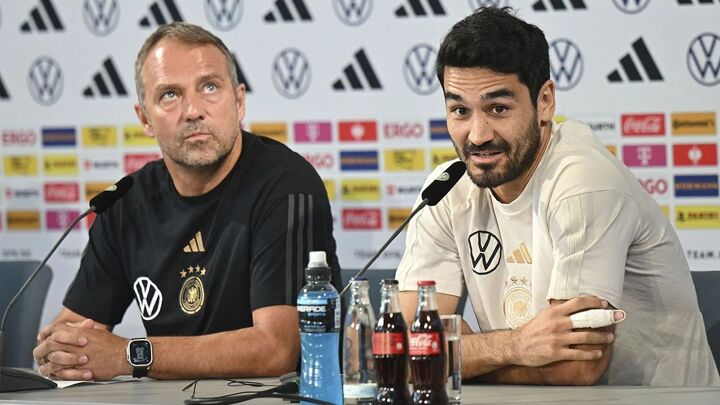Everyone knows that Hansi Flick won a sextuple with Bayern Munich, and more recently exited at the group stage of the World Cup in 2022 with Germany. How do we reconcile such differing results? Football España spoke to German football expert Adam Khan to find out what has gone wrong and right for Flick so far.

Give us a general overall idea of Hansi Flick, how has he gotten this far in the football world?
With Hansi Flick, it was very difficult to understand exactly what he was responsible for, and what he wasn’t. Flick was obviously a long time assistant to Joachim Low at Germany, and then was a coach at Bayern for a long time too. Then he comes into Bayern as head coach, and completely revolutionises a terrible season for Bayern.
People were going as far as saying, was Flick actually responsible for Germany’s 2014 World Cup win? Since Flick left, they haven’t won much, and people were asking, was he this genius working behind the scenes? There was some truth to that, Low was tactically limited and not great with his man management either, he almost had the worst of both worlds, but has won a World Cup.
Flick came in and straight away and brought a lot tactical structure to Bayern, brought an identity to a Bayern side that was extremely lacking in both. Under Niko Kovac, they played like a ‘small’ club, and he was always ridiculed for bringing the underdog mentality from Eintracht Frankfurt to Bayern, where you should be dominating games.
Flick immediately changed that, and brought a guy like Thomas Muller back into the starting team, after he was ostracized by Kovac, which is always a ploy to get the Bayern fans back on side, and Muller also performed very well during the Bayern treble season. Throughout his year and a half at Bayern, he was put on a pedestal, and regarded as one of the greatest managers in world football. Then he went to the national team, and that’s wehere things started to unfold a little bit.
There’s a lot of different things required at a national team. You don’t have as much time on the training ground, you have to deal with a lot of big personalities, like Marc-Andre ter Stegen for example, who is a world class goalkeeper, but has only a handful of national team appearances, so you have to deal with those storylines too. We saw the man-management side of things for b become more of a struggle for Flick there.
At Bayern it was a little easier, they had a small squad, and the German players who formed the core were always playing. Leon Goretzka, Joshua Kimmich, they were always playing, the guys who weren’t were the likes of Omar Richards, a young full-back from England, or Marc Roca from Spain, who didn’t have the pedigree to make demands to be playing. There was a core of 13 or 14 players that played every game, and beyond that, there are players who couldn’t feel hard-done by when they were on the bench.
At the national team, Goretzka was on the bench, a player who notoriously doesn’t deal well with that, Mats Hummels, who is a big personality, and players who aren’t vocal critics, like ter Stegen, but are big personalities and will demand to be playing. Ultimately that was the core of his downfall at the national team, not only at the World Cup, but also in the eyes of the German public. I recommend Barcelona fans watch the Amazon documentary if they can, to get a better sense of Flick. You saw that once results went against him, once discontent rose in the dressing room and media, the rainbow armband issue, all these side notes, Flick really struggled to steer things back onto focusing on football, and uniting the team behind one goal.
That’s something that Flick will have to focus on, and improve in himself, when he goes to not only a huge club like Barcelona, but also a foreign locker room, which brings its own challenges.
How do his sides play, and did Flick’s Bayern and Germany look to play the same way? What can we expect at Barcelona?
Flick is a manager who is keen on a more possession-based style, more than the Leipzig school of thinking and fast transitions. Flick prefers to dominate the game more, and adheres to the German school of thought that rose up after the failures at the turn of the century, focusing a lot more on possession, something we saw throughout the 2010s.

He doesn’t ever play a three at the back, which is something that should be noted. He always tends to go for four, albeit he doesn’t have the largest managerial background as a head coach. Especially when you consider he has only worked at Bayern and Germany, in terms of the player pool he’s dealt with, there’s maybe 40 players or so that have played a match for Flick in his career, it’s quite a small number.
It’s also difficult to say how it impacts him going forward, because at Bayern for instance, you have these unique profiles like Alphonso Davies at left-back, you can’t adapt that to Barcelona, because you don’t have a player who can do what he can, so naturally aspects will have to be changed. As I say though, the two core components of his setup, so far it’s been four at the back, and a 4-3-3 or 4-2-3-1 shape, one-striker formations, with Robert Lewandowski, it’s clear that Flick will build around him. There’s a relationship there, and I would say Lewandowski played his best football under Flick.
Why does the image of Flick in Spain depart so much from the image he has in Germany? What did Flick do so wrong with the German national team?
Obviously, there’s a lot of sort of nepotism working against Flick in the eyes of many people. He was the coach of Bayern in an era when Bayern won everything, so in wider Germany, there was a sense of people wanting to see him fail. Then, scapegoat is the wrong word, but he was really made out to be the ‘clown’ of the 2022 World Cup, the half-time speeches, when you know how the matches went.
In this modern era every manager has to deal with it, but when techonology is recording your every move, in the dressing room – there was an instance when Julian Brandt turned up late for training, and the documentary is recorded in a way where it makes it look like Flick doesn’t have control of the situation. It was also how the narrative was presented.

The media in Germany made out as if he didn’t have control over the Germany side, and he couldn’t turn around adverse situations. To a certain extent, it’s fabricated and the narrative they wanted to do, but on the other hand, there’s nothing else we can judge, in order to say that he can handle it when things are going badly.
At Bayern, he left once there was turmoil, and there was a disagreement with Sporting Director Hasan Salihamidzic, and at Germany, it was a steady decline for almost a year with almost no high points, until the absolute disaster of the World Cup. So there’s question marks over him, despite such a monstruous CV, the actual time he has spent as a head coach, in the spotlight, it’s a relatively small sample size.
What’s something we might not read in most reports about Flick, or perhaps shows a different side of Hansi Flick?
I think the aspect of how long he worked in the national team as an assistant is perhaps an area to look at. How many assistant coaches do you know of in international football? The role of assistant at the national team is a lot more than just showing up to training camps every two months, it’s about developing structures for the whole national team setup, going down through the youth departments, developing an identity, and setting out how football is to be played throughout wider Germany.
I think that’s a really important aspect pertaining to Barcelona, who, correct me if I’m wrong, are in an identity crisis of their own. Having someone who has experience of creating one, of leaving a legacy and a mark on a side, he has left a very notable mark on Germany.
Flick is likely to have a lack of resources, a team not known for its physique, and with instability above. Working in his favour is a core of very talented players, young players with plenty they improve, and a side that showed they could knuckle down and win last year. How do you see his time at Barcelona going?
It’s really difficult to give a prediction on how it will go. An aspect of this is that personally I find the expectations at Barcelona are still too high, when you look at the squad, I think it’s bit of a fool’s game almost taking this job, and you’re sort of bound to lose.
When you compare them to Real Madrid, who are signing Kylian Mbappe after just winning the Champions League, and Barcelona, they might not be making any signing of note this summer. They also desperately need quality and experience. I think Flick probably doesn’t last more than two seasons, but you can also easily see where blame is not only going to be directed at the coach, but perhaps the club not realising their own reality at the moment.
Outside of that, if you want a real prediction, I think Flick wins a title in those two years, but I don’t see it being a league or Champions League. In fact, I don’t see him getting to a Champions League semi-final either, which could really rouse the fanbase in his favour.
Adam Khan is a German football consultant, who has worked with the Bundesliga, and Amazon on Champions League coverage. Find more of his work here, or find him on socials here.









